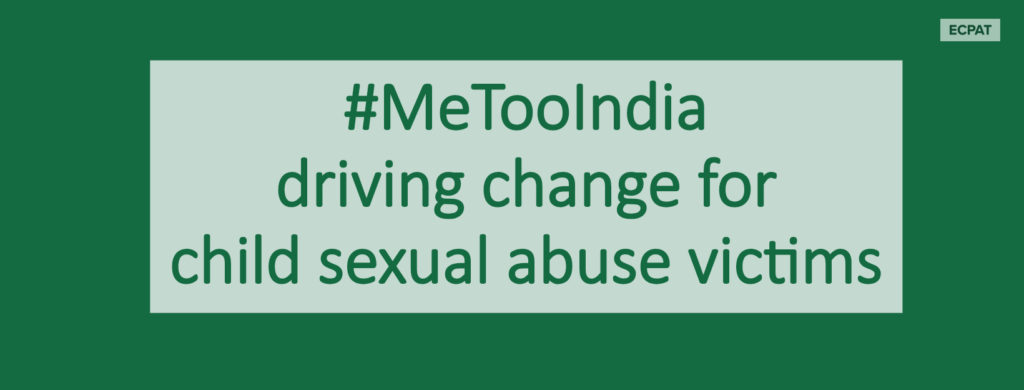Photo: MensXP
The #MeTooIndia hashtag – alive now for several weeks – has been driving conversations around child sexual exploitation, an issue that has for too long been neglected. Countless stories of alleged celebrity offenders, as well as stories of celebrity victims are circulating on social media, often about the sexual abuse people faced as children. As was the case in Western countries, many of the offenders worked in the media and film industry. And both men and women have come forward to talk about the harrowing incidents that have happened to them.

The National Crime Bureau in India recorded more than 36,000 sexual offences against children in 2016. Almost 90 percent of this abuse was committed by family members or people known to the victims, such as fathers, brothers, uncles, neighbours and friends.
In an extremely positive development, the sheer number of anonymous testimonies of victims using the #MeTooIndia hashtag in recent weeks has inspired the Ministry of Women and Child Development to take a more pro-active stance. The ministry has offered to help all victims who are willing to legally proceed against their perpetrators. A recent ministry press release clarifies that there is no time limit for filing cases on child sexual abuse. Minister Maneka Gandhi has urged victims to report cases through the an E-box, a quick and easily accessible online complaint mechanism on the ministry’s website.
#MeToo India is driving significant changes for child sexual abuse victims, who had been silenced and unsupported by the legal system for decades. Although the fairly recent law on Protection of Children from Sexual Offences Act was enacted in 2012 to punish sexual harassment, abuse and online sexual exploitation of children, its implementation has not been efficient.
In 2017, the Delhi High Court noted that about 18 percent of people accused of child sexual abuse under the new law have been found guilty. Considering that the majority of sexual assaults are never reported, this represents only a tiny fraction of victims. The Delhi State Legal Service Authority said that this low conviction rate
“/…/leaves an unsavoury image of the way the criminal justice system is being administered in Delhi, and creates alarm in the mind of the general public that child victims of rape and sexual offences are not getting justice”.
A study by the National Law School Bangalore says that the low conviction rate is mostly due to lack of evidence. Often, victims are threatened or coerced into becoming hostile witnesses or withdrawing the complaint, particularly in cases of incest. In child sexual abuse cases the testimony of the victim is usually the most important piece of evidence, so witness protection is a crucial component in ensuring justice. However, the Indian justice system lacks the infrastructure, resources and training to adequately protect victims and witnesses.
The #MeToo India movement has also lead unprecedented numbers of male victims of child sexual abuse to speak out, and could signify a turning point in a nation where most male victims haven’t dared to speak due to fear of being ridiculed.
It is a remarkable example of people-driven progress. There has been evident change in the public perception of victim testimony and the trauma of child sexual abuse victims. But whilst many Indians find it encouraging to see the long overdue improvements to victim-sensitive justice processes, there is apprehension that legal reforms will be insufficient. Delay in reporting such cases is still consistently questioned and ridiculed publicly. The movement and reforms will need to be accompanied with better sex education, advancing gender equality, and eradicating taboos and patriarchal rules.
Sunethra Sathyanarayanan
Research Intern
ECPAT International